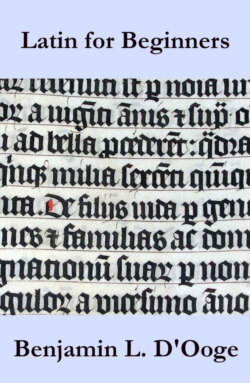Читать книгу Latin for Beginners - BENJAMIN L. D’OOGE - Страница 26
На сайте Литреса книга снята с продажи.
LESSON IV
ОглавлениеFIRST PRINCIPLES (Continued)
[Special Vocabulary]
[See Transcriber’s Note at beginning of text.]
NOUNS
«dea», goddess (deity) Diā´na, Diana «fera», a wild beast (fierce) Lātō´na, Latona «sagit´ta», arrow
VERBS
«est», he (she, it) is; «sunt», they are «necat», he (she, it) kills, is killing, does kill
CONJUNCTION[A]
«et», and
PRONOUNS
«quis», interrog. pronoun, nom. sing., who? «cuius» (pronounced co͝oi´yo͝os, two syllables), interrog. pronoun, gen. sing., whose?
[Footnote A: A conjunction is a word which connects words, parts of sentences, or sentences.]
«35.» We learned from the table (§33) that the Latin nominative, genitive, and accusative correspond, in general, to the nominative, possessive, and objective in English, and that they are used in the same way. This will be made even clearer by the following sentence:
«Fīlia agricolae nautam amat», the farmer’s daughter (or the daughter of the farmer) loves the sailor
What is the subject? the direct object? What case is used for the subject? for the direct object? What word denotes the possessor? In what case is it?
«36.» RULE. «Nominative Subject.» The subject of a finite verb is in the Nominative and answers the question Who? or What?
«37.» RULE. «Accusative Object.» The direct object of a transitive verb is in the Accusative and answers the question Whom? or What?
«38.» RULE. «Genitive of the Possessor.» The word denoting the owner or possessor of something is in the Genitive and answers the question Whose?
[Illustration: DIANA SAGITTAS PORTAT ET FERAS NECAT]
